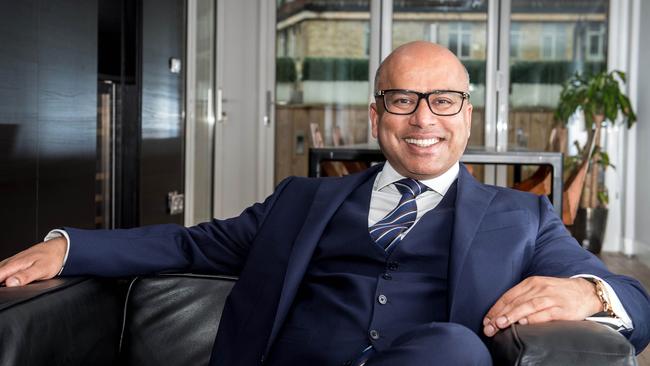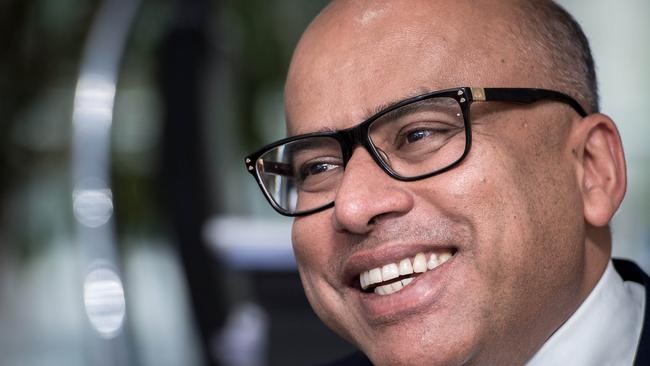British billionaire Sanjeev Gupta saves Whyalla steelworks from closure by acquiring Arrium
THE British billionaire who has saved thousands of jobs in Whyalla started as an university student clinching deals worth millions in his dormitory room.
SA News
Don't miss out on the headlines from SA News. Followed categories will be added to My News.
THE British billionaire who has saved thousands of jobs in Whyalla got into strife as a student by selling commodities worth millions in his dormitory room at Cambridge University.
Sanjeev Gupta, 45, since has rescued 25 steel mills, car plants and engineering workshops in Britain from closure, even paying some workers half their wages while negotiating complex deals to keep ailing businesses operating.
Mr Gupta is part of a wealthy, industrialist British family of Indian descent which owns GFG Alliance, an international conglomerate specialising in metal production, energy and financing.
He believes the future lies in renewable energy powering heavy industry and the recycling of scrap British steel. His metal products are used by iconic English companies ranging from Rolls Royce to Jaguar.
Born in Punjab in northern India, his grandfather owned a steel mill while his father, Parduman Gupta, built a vast business empire by selling Victor bicycles before creating GFG Alliance, a multi-billion dollar global industrial giant.
Mr Gupta was sent to St Edmund’s School in Canterbury at the age of 12 by his father, who had left school aged 11. He apparently needed the discipline after running away with his brother from a boarding school in the Himalayas.

Upon finishing his secondary education with high marks, Mr Gutpa spent two years in Turkey selling his father’s bicycles before returning to England, where he was accepted into economics and business management at Cambridge University.
Before long he had set up a company, Liberty House, and was conducting large trade deals from his university dormitory room, selling everything from chemicals to frozen chicken feet.
His relentless wheeling and dealing saw him racking up large phone bills which attracted the attention of irate Cambridge administrators, who kicked him out for breaching rules governing the use of university residential property.
Mr Gupta was told to find new accommodation, which he used to continue selling commodities to Liberty House’s growing client base in Nigeria and other African countries.
The company continued to flourish over the next two decades, trading steel, rice, sugar and engineering goods before specialising in steel and aluminium production, engineering, power generation, banking and commodities trading.
Mr Gupta has focussed in recent years on targeting ailing British and Scottish steel mills and industrial plants, acquiring them and using renewable energy and recycled British scrap steel to reboot their viability.
One $500 million deal completed late last year saw him save Scotland’s last major steelworks, Britain’s last remaining aluminium smelter and the United Kingdom’s biggest electric furnance for melting scrap steel.
The deal, which included hydro electric power stations near Fort William, also included more than 45,050ha, or 400 sq km, of Scottish highlands, making him the UK’s fifth largest landholder.
Mr Dupta’s corporate headquarters are in Mayfair, London, with offices in 30 countries, including major operations in Dubai, Singapore and Hong Kong. His company’s annual turnover now exceeds $5 billion.
Two months ago, Mr Gupta was named chief executive of the year at the Platts Global Metals Awards in London for his success at rejuvenating dying heavy industrial businesses.
He visited South Australia for the first time last November, meeting with Treasurer Tom Koutsantonis before being taken on a guided tour of the Whyalla steelworks with Arrium’s administrators.
Six months earlier, he reached an agreement to buy the Scottish steel plants, using the acquisition to launch his “Greensteel” strategy, where renewable energy is used to recycle scrap steels.
Shortly after returning to England from Australia, he finalised another deal, where his company acquired ailing steel mills in West Yorkshire and China, saving 1700 jobs.
Known as a workaholic who rarely takes holidays, Mr Gupta has told British media he was “born into business”.
Business commentators regard him as a visionary who is prepared to take huge financial risks to revive ailing businesses.
Fittingly, when he got married to an Englishwoman who was his company treasurer after a secret seven-year relationship, the first song at their wedding was Kenny Rogers’ The Gambler.
Mr Gupta lives with his wife, Nicola, and their three young children on the border of England and South Wales.



